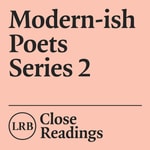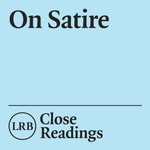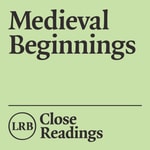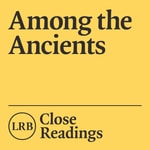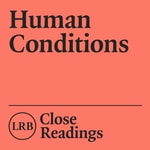Among the Ancients II – Details, episodes & analysis
Podcast details
Technical and general information from the podcast's RSS feed.
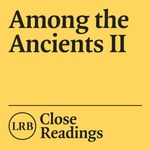
Among the Ancients II
Anthony Wilks
Frequency: 1 episode/30d. Total Eps: 13

Emily Wilson, celebrated classicist and translator of Homer’s Iliad and Odyssey, is back to take on another twelve vital works of Greek and Roman literature with the LRB’s Thomas Jones, loosely themed around truth and lies – from from Aesop’s Fables to Marcus Aurelius’s Meditations.
Episodes will appear once a month throughout 2024.
Among the Ancients is part of the Close Readings podcasts collection from the London Review of Books.
To listen to all the series in full, subscribe:
Directly in Apple Podcasts at the top of this podcast
For Spotify and other podcast apps here: https://lrb.supportingcast.fm/close-readings
Hosted on Acast. See acast.com/privacy for more information.
Recent rankings
Latest chart positions across Apple Podcasts and Spotify rankings.
Apple Podcasts
🇬🇧 Great Britain - books
17/06/2025#87🇬🇧 Great Britain - books
27/05/2025#79🇬🇧 Great Britain - books
01/03/2025#93🇬🇧 Great Britain - books
25/12/2024#71🇬🇧 Great Britain - books
24/12/2024#69🇬🇧 Great Britain - books
23/12/2024#89🇨🇦 Canada - books
02/12/2024#60🇬🇧 Great Britain - books
29/10/2024#98
Spotify
No recent rankings available
Shared links between episodes and podcasts
Links found in episode descriptions and other podcasts that share them.
See all- https://apple.co/3pJoFPq
447 shares
- https://lrb.me/closereadings
81 shares
- https://lrb.me/atasignuppod
50 shares
- https://lrb.me/ataapple
49 shares
RSS feed quality and score
Technical evaluation of the podcast's RSS feed quality and structure.
See allScore global : 69%
Publication history
Monthly episode publishing history over the past years.
Juvenal
Episode 11
jeudi 24 octobre 2024 • Duration 14:05
In this episode, we tackle Juvenal, whose sixteen satires influenced libertines, neoclassicists and early Christian moralists alike. Conservative to a fault, Juvenal’s Satires rails against the rapid expansion and transformation of Roman society in the early principate. But where his contemporary Tacitus handled the same material with restraint, Juvenal’s work explodes with vivid and vicious depictions of urban life, including immigration, sexual mores and eating habits. Emily and Tom explore the idiosyncrasies of Juvenal’s verse and its handling in Peter Green’s translation, and how best to parse his over-the-top hostility to everyone and everything.
Non-subscribers will only hear an extract from this episode. To listen in full and to our other Close Readings series, sign up:
Directly in Apple Podcasts: https://apple.co/3pJoFPq
In other podcast apps: lrb.me/closereadings
Further reading in the LRB:
Remembering Peter Green
https://www.lrb.co.uk/blog/2024/september/peter-green-1924-2024
Claude Rawson: Blistering Attacks
https://www.lrb.co.uk/the-paper/v02/n21/claude-rawson/blistering-attacks
Clare Bucknell & Colin Burrow: What is satire?
https://www.lrb.co.uk/podcasts-and-videos/podcasts/close-readings/on-satire-what-is-satire
Hosted on Acast. See acast.com/privacy for more information.
Tacitus
Episode 10
mardi 24 septembre 2024 • Duration 12:51
The Annals, Tacitus’ study of the emperors from Tiberius to Nero, covers some of the most vivid and ruthless episodes in Roman history. A masterclass in political intrigue (and how not to do it), the Annals features mutiny, senatorial backstabbing, wars on the imperial frontiers, political purges and enormous egos. Emily and Tom explore the many ambiguities that make the Annals rewarding, as well as difficult, reading and discuss Tacitus’ knotty style and approach to history.
Non-subscribers will only hear an extract from this episode. To listen in full and to our other Close Readings series, sign up:
Directly in Apple Podcasts: https://apple.co/3pJoFPq
In other podcast apps: lrb.me/closereadings
Further reading in the LRB:
Mary Beard: Four-Day Caesar
https://www.lrb.co.uk/the-paper/v26/n02/mary-beard/four-day-caesar
Anthony Grafton: Those Limbs We Admire
https://www.lrb.co.uk/the-paper/v33/n14/anthony-grafton/those-limbs-we-admire
Shadi Bartsch: Fratricide, Matricide and the Philosopher
https://www.lrb.co.uk/the-paper/v37/n12/shadi-bartsch/fratricide-matricide-and-the-philosopher
Mark Ford: The Death of Petronius
https://www.lrb.co.uk/the-paper/v30/n24/mark-ford/the-death-of-petronius
Emily Wilson is Professor of Classical Studies at the University of Pennsylvania and Thomas Jones is an editor at the London Review of Books.
Get in touch: [email protected]
Hosted on Acast. See acast.com/privacy for more information.
Introducing Among the Ancients II
Episode 1
lundi 1 janvier 2024 • Duration 11:10
Emily Wilson, celebrated classicist and translator of Homer’s Iliad and Odyssey, is back to take on another twelve vital works of Greek and Roman literature with the LRB’s Thomas Jones, loosely themed around truth and lies – from from Aesop’s Fables to Marcus Aurelius’s Meditations.
Non-subscribers will only hear extracts from most of the episodes in this series. To listen in full and to our other Close Readings series, sign up:
Directly in Apple Podcasts: https://apple.co/3pJoFPq
In other podcast apps: lrb.me/closereadings
Emily Wilson is Professor of Classical Studies at the University of Pennsylvania and Thomas Jones is an editor at the London Review of Books.
Get in touch: [email protected]
Hosted on Acast. See acast.com/privacy for more information.
Lucan
Episode 9
samedi 24 août 2024 • Duration 13:17
In his prodigious, prolific and very short career, Lucan was at turns championed, disavowed and finally forced into suicide at 25 by the emperor Nero. His only surviving work is Civil War, an account of the bloody and chaotic power struggle between Julius Caesar and Pompey the Great. In their first episode on Latin literature’s so-called ‘Silver Age’, Tom and Emily dive into this brutal and unforgiving epic poem. They explore Lucan’s slippery relationship to power, his rhetorical virtuosity and the influence of Stoicism on his worldview.
Non-subscribers will only hear an extract form this episode. To listen in full and to our other Close Readings series, sign up:
Directly in Apple Podcasts: https://apple.co/3pJoFPq
In other podcast apps: lrb.me/closereadings
Further reading in the LRB:
John Henderson: Dead Eyes and Blank Faces
https://www.lrb.co.uk/the-paper/v20/n07/john-henderson/dead-eyes-and-blank-faces
Nora Goldschmidt: Pompeian Group Therapy
https://www.lrb.co.uk/the-paper/v44/n18/nora-goldschmidt/pompeian-group-therapy
Thomas Jones: See you in hell, punk
https://www.lrb.co.uk/the-paper/v40/n23/thomas-jones/see-you-in-hell-punk
Emily Wilson is Professor of Classical Studies at the University of Pennsylvania and Thomas Jones is an editor at the London Review of Books.
Get in touch: [email protected]
Hosted on Acast. See acast.com/privacy for more information.
Plautus and Terence
Episode 8
mercredi 24 juillet 2024 • Duration 14:27
In episode seven, we turn to some of the earliest surviving examples of Roman literature: the raucous, bawdy and sometimes bewildering world of Roman comedy. Plautus and Terence, who would go on to set the tone for centuries of playwrights (and school curricula), came from the margins of Roman society, writing primarily for plebeians and upsetting the conventions they simultaneously established. Plautus’ ‘Menaechmi’ is full of coinages, punning and madcap doubling. Terence’s troubling ‘Hecyra’ tells a much darker story of Roman sexual mores while destabilizing misogynistic stereotypes. Emily and Tom discuss how best to navigate these very early and enormously influential plays, and what they lend to Shakespeare, Sondheim and the modern sitcom.
Non-subscribers will only hear an extract from this episode. To listen in full and to our other Close Readings series, sign up:
Directly in Apple Podcasts: https://apple.co/3pJoFPq
In other podcast apps: lrb.me/closereadings
Further reading in the LRB:
Emily Wilson: Ave, Jeeves!
https://www.lrb.co.uk/the-paper/v30/n04/emily-wilson/ave-jeeves
James Davidson: Laugh as long as you can
https://www.lrb.co.uk/the-paper/v37/n14/james-davidson/laugh-as-long-as-you-can
Emily Wilson is Professor of Classical Studies at the University of Pennsylvania and Thomas Jones is an editor at the London Review of Books.
Get in touch: [email protected]
Hosted on Acast. See acast.com/privacy for more information.
Lucian
Episode 7
lundi 24 juin 2024 • Duration 14:03
The broad theme of this series, truth and lies, was a favourite subject of Lucian of Samosata, the last of our Greek-language authors. A cosmopolitan and highly cultured Syrian subject of the Roman Empire in the second century CE, Lucian wrote in the classical Greek of fifth-century Athens. His razor-sharp satire was a model for Erasmus, Voltaire and Swift. Emily and Tom share some of their favourite excerpts from ‘A True History’ and other works – with trips to the moon, boundary-pushing religious scepticism and wildly improbable but not technically untrue readings of Homer – and discuss why they still read as fresh and funny today.
Non-subscriber will only hear extracts from the rest of this series. To listen in full and to our other Close Readings series, sign up:
Directly in Apple Podcasts: https://apple.co/3pJoFPq
In other podcast apps: lrb.me/closereadings
Further reading in the LRB:
Tim Whitmarsh: Target Practice
https://www.lrb.co.uk/the-paper/v32/n04/tim-whitmarsh/target-practice
James Davidson: Stomach-Churning
https://www.lrb.co.uk/the-paper/v19/n02/james-davidson/stomach-churning
Emily Wilson is Professor of Classical Studies at the University of Pennsylvania and Thomas Jones is an editor at the London Review of Books.
Get in touch: [email protected]
Hosted on Acast. See acast.com/privacy for more information.
Plato's 'Symposium'
Episode 6
vendredi 24 mai 2024 • Duration 11:31
Plato’s 'Symposium', his philosophical dialogue on love, or eros, was probably written around 380 BCE, but it’s set in 416, during the uneasy truce between Athens and Sparta in the middle of the Peloponnesian War. A symposium was a drinking party, though Socrates and his friends, having had a heavy evening the night before, decide to go easy on the wine and instead take turns making speeches in praise of love – at least until Alcibiades turns up, very late and very drunk. In this episode of Among the Ancients, Emily and Tom discuss the dialogue’s philosophical ideas, historical context and narrative form, and why Aristophanes gets the hiccups.
Non-subscriber will only hear extracts from the rest of this series. To listen in full and to our other Close Readings series, sign up:
Directly in Apple Podcasts: https://apple.co/3pJoFPq
In other podcast apps: lrb.me/closereadings
Further reading:
Donald Davidson: Plato’s Philosopher
https://www.lrb.co.uk/the-paper/v07/n14/donald-davidson/plato-s-philosopher
Anne Carson: Oh What a Night (Alkibiades)
https://www.lrb.co.uk/the-paper/v42/n22/anne-carson/oh-what-a-night-alkibiades
M.F. Burnyeat: Art and Mimesis in Plato’s Republic
https://www.lrb.co.uk/the-paper/v20/n10/m.f.-burnyeat/art-and-mimesis-in-plato-s-republic
Hosted on Acast. See acast.com/privacy for more information.
Pindar and Bacchylides
Episode 5
mercredi 24 avril 2024 • Duration 11:19
In the fifth episode of Among the Ancients II we turn to Greek lyric, focusing on Pindar’s victory odes, considered a benchmark for the sublime since antiquity, and the vivid, narrative-driven dithyrambs of Bacchylides. Through close reading, Emily and Tom tease out allusions, lexical flourishes and formal experimentation, and explain the highly contextual nature of these tightly choreographed, public-facing poems. They illustrate how precarious work could be for a praise poet in a world driven by competition – striking the right note to please your patron, guarantee the next gig, and stay on good terms with the gods.
Non-subscriber will only hear extracts from the rest of this series. To listen in full and to our other Close Readings series, sign up:
Directly in Apple Podcasts: https://apple.co/3pJoFPq
In other podcast apps: lrb.me/closereadings
Further reading in the LRB:
Leofranc Holford-Strevens: Dithyrambs for Athens
https://www.lrb.co.uk/the-paper/v27/n04/leofranc-holford-strevens/dithyrambs-for-athens
Barbara Graziosi: Flower or Fungus?
https://www.lrb.co.uk/the-paper/v27/n04/leofranc-holford-strevens/dithyrambs-for-athens
Emily Wilson is Professor of Classical Studies at the University of Pennsylvania and Thomas Jones is an editor at the London Review of Books.
Get in touch: [email protected]
Hosted on Acast. See acast.com/privacy for more information.
Herodotus
Episode 4
dimanche 24 mars 2024 • Duration 10:30
Some of the most compelling stories of the Classical world come from Herodotus‘ 'Histories', an account of the Persian Wars and a thousand things besides. Emily and Tom chart a course through Herodotus‘ history-as-epic, discussing how best to understand his approach to history, ethnography and myth. Exploring a work full of surprising, dramatic and frequently funny digressions, this episode illustrates the artfulness and deep structure underpinning the 'Histories', and, despite his obvious Greek bias, Herodotus‘ genuine interest in and respect for cultural difference.
Non-subscriber will only hear extracts from the rest of this series. To listen in full and to our other Close Readings series, sign up:
Directly in Apple Podcasts: https://apple.co/3pJoFPq
In other podcast apps: lrb.me/closereadings
Further reading in the LRB:
Peter Green: On Liking Herodotus
https://www.lrb.co.uk/the-paper/v36/n07/peter-green/on-liking-herodotus
Emily Wilson is Professor of Classical Studies at the University of Pennsylvania and Thomas Jones is an editor at the London Review of Books.
Get in touch: [email protected]
Hosted on Acast. See acast.com/privacy for more information.
Aesop
Episode 3
samedi 24 février 2024 • Duration 10:26
Supposedly an enslaved man from sixth-century Samos, Aesop might not have ever really existed, but the fables attributed to him remain some of the most widely read examples of classical literature. A fascinating window into the ‘low’ culture of ancient Greece, the Fables and the figure of Aesop appear in the work of authors as diverse as Aristophanes, Plato and Phaedrus, serving new purposes in new contexts. Emily and Tom discuss how Aesop’s fables as we know them came to be, make sense of their moral contradictions and unpack some of the fables that are most opaque to modern readers.
Non-subscriber will only hear extracts from the rest of this series. To listen in full and to our other Close Readings series, sign up:
Directly in Apple Podcasts: https://apple.co/3pJoFPq
In other podcast apps: lrb.me/closereadings
Further reading in the LRB:
Tim Whitmarsh: Crashing the Delphic Party
https://www.lrb.co.uk/the-paper/v33/n12/tim-whitmarsh/crashing-the-delphic-party
Emily Wilson is Professor of Classical Studies at the University of Pennsylvania and Thomas Jones is an editor at the London Review of Books.
Get in touch: [email protected]
Hosted on Acast. See acast.com/privacy for more information.



